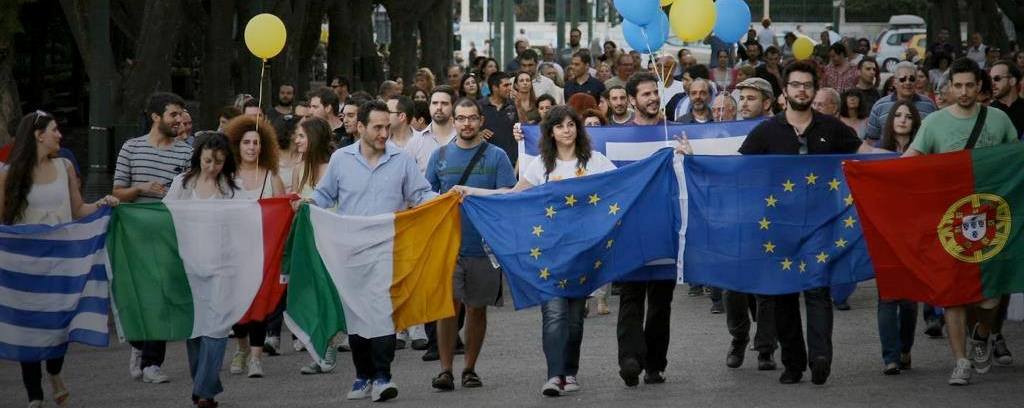By Sotiris Mitralexis*
A spectre is haunting Greece, the spectre of the East-West divide. “Modern Greece between East and West” seems to be a subject that preoccupies Greeks—scholars, politicians, public intellectuals, journalists and ordinary citizens alike—since the very creation of the modern Greek state in the 19th century. It hides beneath numerous forms: apart from the explicit “belonging to the West” discourse, it also emerges as the “cultural dualism” narrative of benevolent reformers and reactionary underdogs, the “We stay in Europe” (ΜένουμεΕυρώπη) political slogan, or the “Greece has not undergone Enlightenment” narrative, among many others of its incarnations.
Perhaps the most famous exclamation concerning this is Constantine Karamanlis ’“We belong to the West,” turning this into the official doctrine of the state: the quote has come a long way from its initial context, acquiring most mythical dimensions:
“I must repeat myself: politically, defensively, economically, culturally speaking, Greece belongs to the West […] Of course, we belong to the West! Greece, be it traditionally or because of interest, belongs to the Western world.” (1976)
It is interesting to note, and this should underscore every discussion on the subject, that in this “East and West” dilemma as it is usually portrayed there is no East; practically, the question concerns the extent to which Greece does or does not belong to “the West,” whatever that might be—that is, there is no person or party in Greece’s public sphere that advocates Greece belonging to “the East,” be that the East proper, Middle East, or more specifically Turkey and Asia Minor. Even the phrase “our own East” (ἡ καθ’ ἡμᾶς Ἀνατολή) denotes precisely a break with what would be the East proper, it denotes a here-and-now rather than an allegiance to something Eastern, geographically or otherwise.
The sole exception, which emerges from well beyond Greece, is Samuel Huntington’s Clash of Civilizations theory, which sparked outrage in Greece when it was first published as a Foreign Affairs article and subsequently as a book in the 90s: according to it, Greece does not belong to the West precisely because it is predominantly Orthodox, while Western countries cannot but be predominantly Roman Catholic or Protestant — at least culturally so — and claim a classical legacy only through Western European versions of Christianity. Most Greek established intellectuals and politicians were quick to dismiss the idea with an almost existential anxiety, denoting that not being different, not possessing an otherness, is a sine qua non for their understanding of Modern Greece.
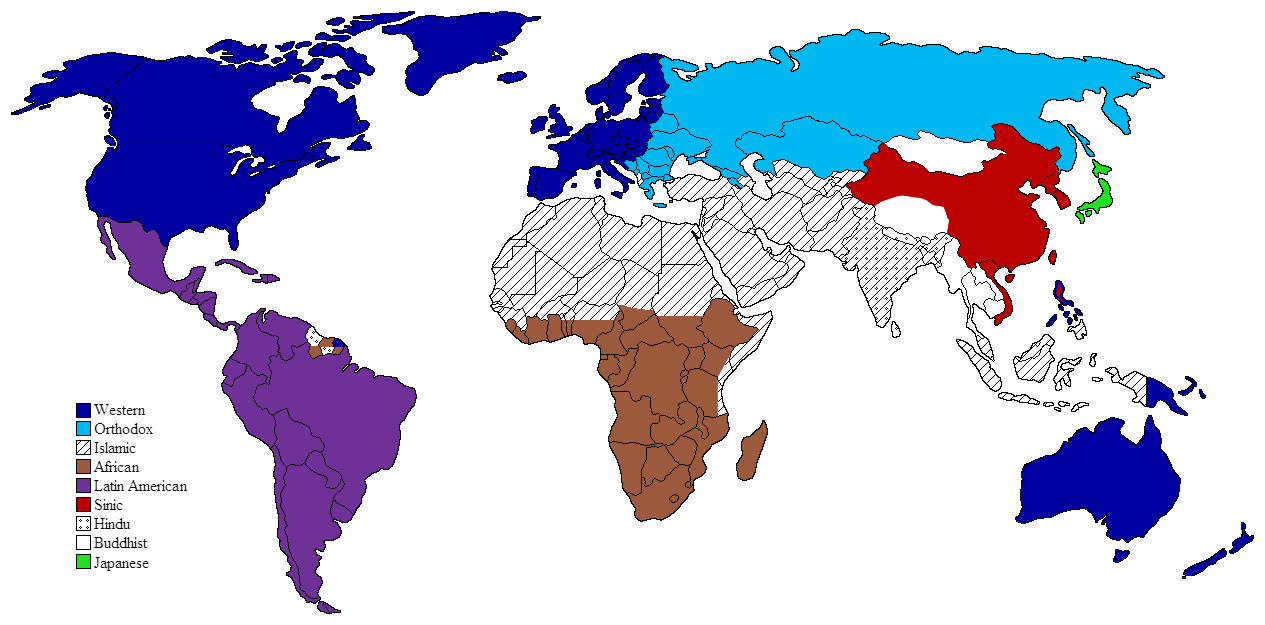 What I hope to show in this article is that this very dilemma between East and West as it is usually portrayed is problematic, that this very dilemma and fixation with “belonging to the West” engenders obstacles for Greece’s flourishing, prosperity, and balance. That the fixation, in many different forms, on this question turns the country into a never-ending group therapy session, without catharsis being anywhere in sight.
What I hope to show in this article is that this very dilemma between East and West as it is usually portrayed is problematic, that this very dilemma and fixation with “belonging to the West” engenders obstacles for Greece’s flourishing, prosperity, and balance. That the fixation, in many different forms, on this question turns the country into a never-ending group therapy session, without catharsis being anywhere in sight.
What is, however, “the West”?
Before studying how Greece thinks about the West and the East, or rather the Non-West, it’s important to ask whether that geographical term indeed possesses the concrete, self-evidently given and undisputed non-geographical content it is claimed it does. Scholars (here, Lewis and Wigen) identify at least seven different versions of the “West,” and many could argue for more:
“The portion of the earth denoted by the term West varies tremendously from author to author and from context to context (the area enclosed by a heavy black line is what has been called the West):
(1) One extreme incarnation, where the West includes only England (“The Wogs begin at Calais,’” as an old racist, xenophobic refrain has it).
(2) The standard minimal West, which is essentially Britain, France, the Low Countries, and Switzerland. As interpreted by Thomas Mann, this West is basically centred on France.
(3) The historical West of medieval Christendom, circa 1250.
(4) The West of the Cold War Atlantic alliance, or Europe and its “settler colonies” (with Japan often included as well).
(5) The greater “cultural” West. By the criteria of language, religion, and “high culture,” Latin America and the areas of concentrated European settlement in South Africa are added to the West. The Philippines is sometimes included here as well. (Those more concerned with “race,” on the other hand, are inclined to add only Argentina, Uruguay, and southern Brazil.)
(6) The maximum West of the eco-radical and New Age spiritual imagination. In this formulation, all areas of Christian and Islamic heritage are included.
(7) The global (future?) West of modernization. See, for instance, Arnold Toynbee’s cartography showing the entire globe as under Western hegemony in one form or another, whether political, “associative” (India, Iran, Ethiopia), or “in the heterodox form of Communism.“ [1]
As we can see, “the West” is a quite unstable concept. (However and importantly for this study, as Lewis and Wigen also argue, “the original and persistent core of the West has always been Latin Christendom, derived ultimately from the Western Roman Empire—with (ancient) Greece included whenever the search for origins goes deeper,” while “the most significant historical divide across Europe was that separating the Latin church’s Europa Occidens from the Orthodox lands of the Byzantine and Russian spheres.” [2] How does a geographical, spatial notion acquire cultural and political content and significance?
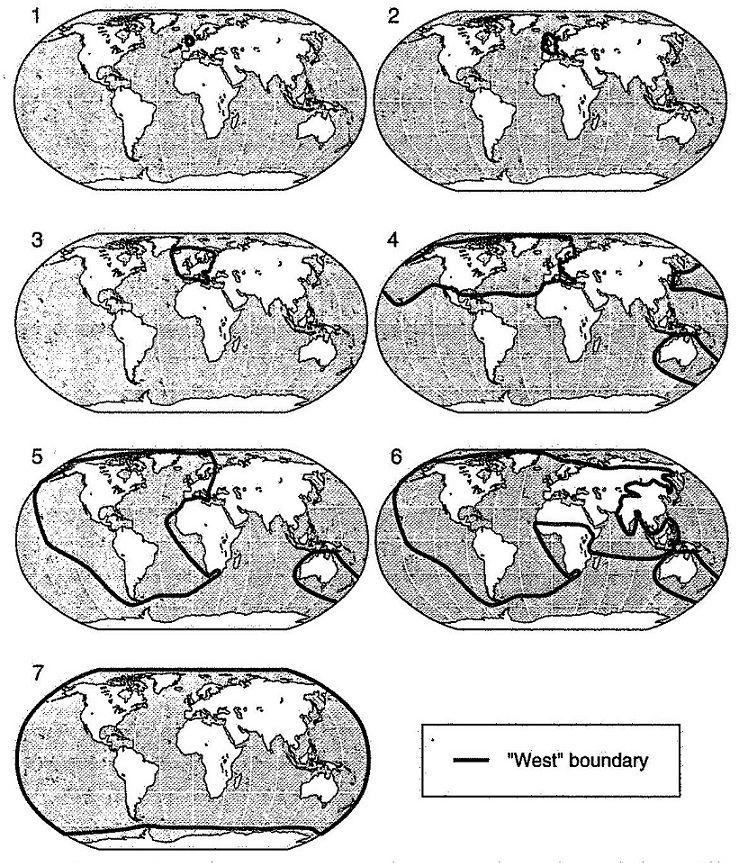 Returning now to Greece’s fixation with the purported dilemma since the very inception of the modern Greek state: From the very beginning, since Adamantios Korais’ writings before the completion of the Greek War of Independence, this discourse has taken peculiar forums. For example, Korais’ admiration for the French and France in general lead him to advocate “one nation,” the Greek-French, Γραικογάλλοι, who are and should be united in nothing less than one nation.
Returning now to Greece’s fixation with the purported dilemma since the very inception of the modern Greek state: From the very beginning, since Adamantios Korais’ writings before the completion of the Greek War of Independence, this discourse has taken peculiar forums. For example, Korais’ admiration for the French and France in general lead him to advocate “one nation,” the Greek-French, Γραικογάλλοι, who are and should be united in nothing less than one nation.
«Οἱ Ἕλληνες (Γρακοὶ) καὶ οἱ Γάλλοι ἑνωμένοι καὶ δεμένοι μὲ φιλία
δὲν εἶναι πλέον Γρακοὶ – Γάλλοι ἀλλὰ ἕνας λαός: Γραικογάλλοι».
At the same time, Korais would advocate his theory of the metakenosis according to which Greece becomes Greek in so far as and to the extent that it copies and imitates Western Europe. According to Korais, the classical Greek legacy (the exclusive focus on which as the sole source of identity clashes with the very flow of history) was continued far away from Greece, in Western Europe’s geography through the historical trajectory of the Renaissance, the Enlightenment et cetera, while Greece under it is Byzantine and then Ottoman continuations lost the capacity claim this legacy. Thus, according to Korais, it is the West that became Greek and continued the true Greece through history, while Greeks, having lost this continuity, have to now imitate Western Europe in order to achieve Greekness and to become Greeks again.
The idea might seem extreme today, not only far-fetched but truly surreal, however it certainly belongs to one of the figureheads of modern Greece’s spiritual legacy or rather to the spiritual legacy that the state has chosen for itself. For the dreams of Greeks during the war of independence and the ideology of the state after King Otto and his Bavarian Regents were certainly not identical.
The “underdog culture versus reform culture” scheme
As I said in the beginning, this desire without fulfilment for alignment to “the West” takes many and peculiar forms. A surprisingly influential East/West, or rather West and non-West, discourse par excellence is Nikiforos Diamandouros’ “underdog culture versus reform culture” theory. (Diamandouros is a member of the Academy of Athens and a political science professor, as well as the European Ombudsman for many years. He served as ideological advisor to prime minister Costas Simitis and was a party list candidate—ψηφοδέλτιο ἐπικρατείας—with the reform-centred party To Potami in 2015. He was not elected an MP, but prior to the elections it had surfaced that he would have been proposed as a potential prime minister in a coalition government, were SYRIZA not to have formed a government). Diamandouros is to be counted among the most influential figures in Greece’s “modernisation” block, i.e. influential on other opinion makers, even though his name is not widely known among the general public.

Photo source: Nikiforos Diamandouros – Why did I dismiss a proposal to become prime minister in 2011 [in Greek, The TOC, 15.9.2015]
There is arguably nothing more fulfilling for a scholar than witnessing one’s hermeneutic schema becoming the standard frame of reference, giving shape and voice to pre-existing discourses and achieving almost universal recognition—even more so if this schema describes one’s own country, and if its acclaim emerges within the country itself. It is safe to say that this is precisely the case with Diamandouros’ “underdog culture versus reform culture” theory: the narrative that there is a fundamental division in Greek society and political life, a division into an “underdog” non-Western conservative culture on the one hand and a “reformist” Western culture on the other, the former emerging as an impediment to progress, the latter as guaranteeing it. In Diamandouros’ problematic dichotomy and narrative, the “underdog culture” represents the majority of the Greek population; it has deep roots in Byzantine and Ottoman times as well as in Orthodox Christianity, and reflects tendencies towards populism and clientelism, nationalism and xenophobia. It sees domestic politics as well as international relations as a conflict between the powerful and the powerless, always sympathising with the ones it perceives as powerless, as the victims, Greece being one of them. It is a culture of protest and resistance, with an hostility against reform, modernisation, globalisation, Europe, the US and the West. On the other hand, the “reform culture” of the modernisers is its polar opposite: it has deep roots in the philosophical and political legacy of the Enlightenment and strives towards Europeanization, rationalisation, liberal democracy and an institutions-based state, the separation of state and society and cosmopolitanism. It affirms capitalism and the free market economy, and while it reflects a minority in the Greek people, its strongholds are certain political elites, academics, intellectuals, and the diaspora. Not without important fluctuations and occasional changes, Modern Greek history and political history in particular can, according to this theory, be read as a struggle between the “underdog culture” of the backward-looking majority and the “reform culture” of the Enlightened minority, with the latter losing the battle and the former winning it.
I do not only hold that this model of Greece is fundamentally flawed, but more importantly that its prevalence and pre-eminence in diverse analyses concerning contemporary Greece renders non-partisan (or, at the very least, less-partisan) readings of Greece impossible; it blinds us even to basic facts, dictating a problematic framework of interpretation and reference and becoming a very real impediment to the progress of social sciences as far as the scholarly engagement with modern Greece is concerned.
Α Greek Neo-orientalism?
Central to my argument is that such schematisations constitute a peculiar Greek Neo-orientalism, in that they embody the very essence of cultural imperialism in Orientalism (or “Balkanism,” as described by Maria Todorova), which sees Western society as developed, rational, democratic, and thereby superior, while non-Western societies are undeveloped, irrational, inflexible, and implicitly inferior (this is a definition of Orientalism). Here, the main traits of Greek Neo-orientalism are that (a) it is voiced by Greeks, rather than by others, when they describe/criticize their own country, (b) it employs typical Orientalist/Balkanist stereotypes, albeit appropriated accordingly, including in the narrative Greece’s historical background (and proposing a rather peculiar hermeneutical framework for its understanding), (c) it always proposes, explicitly or implicitly, a further and enhanced political, cultural, and economic alignment with “the West” (in whichever way this is being defined by particular Greek Neo-Orientalists), while holding that such an alignment was never truly the case.
Greek Neo-orientalism is similar to but distinct from Balkanism; the difference lies in what is central to what I call Greek Neo-orientalism, i.e.that its narratives, originate in Greece, or at the very least by Greeks abroad, and may then be exported and reiterated by non-Greeks—rather than coming to Greece “from the outside” as it were, from external sources, and then becoming internalised. In insisting on maintaining a connection between the two terms, one could say that Balkanism evolves into Greek Neo-orientalism precisely at the moment when its stereotypes are internalised and appropriated to the point that they undergo a fermentation and emerge as original ideas, having turned into the particular schematisations under scrutiny here, which are perceived as a distinct universe of ideas—often acquiring a loftiness and theoretical refinement that is not to be found in the original and by far surpass it—Stelios Ramfos can be cited as an extreme example of such an odious metamorphosis.Thus, Neo-orientalism is implicitly responding to the need prompted by Balkanism in Greek intellectuals: in attempting to escape being themselves characterised by the stereotypes of Balkanism, in attempting to “become Western/European,” they take these very stereotypes to a whole new level as original intellectual production, to which they indeed result, rather than merely reiterating them.
West/non-West divide narratives
Today, forms and evolutions of this cultural dualism dominate public discourse and politics. Recently, we witnessed a further intensification of the implementation of geographical terms—for “the West” is primarily, if not literally speaking exclusively, a geographical term—as if they were political, cultural and historical. Witness the rhetoric that was developed before the Greek referendum of the 5th of July, 2015, which was held on a fiscal issue—and not on a metaphysical question on identity and of cosmic proportions: the “Yes” side had as its main slogan and self-determination the phrase “We remain in Europe”—Europe, not the EU—: the geographical meaning of Europe, in which we should “remain,” summarizes a number of historical, cultural and political attainments that lie far beyond the simple standard of prosperity. “We remain in Europe”: Thus in the 2015 referendum on the economy—or even perhaps, as a theory goes, implicitly on Greece’s currency, whether that would be the euro or a national currency, a theory that was not validated by the events that followed—Greek public discourse shone again with arguments on the East-West divide, this time in the incarnation of “Europe” versus an unknown and unnamed abyss or at least the wilderness that lies beyond it, as the “We Remain in Europe” slogan implies. As if Greece had to deal with a metaphysical, and not fiscal, dilemma of whether one belongs to an abstract trans-historical “Europe” beyond the EU itself, which is exclusively endowed with being civilised, humanistic et cetera. My concern here is not the affairs of Greece during the referendum and its political problems and programs, but rather than that, the very fact that a referendum on political and economic matters acquired these quasi-metaphysical dimensions, again alluding to the East –West divide.
Other forums of that narrative emerge in Greece’s public discourse with TV-enforced figures such as Stelios Ramfos and soundbites such as “Greece has not gone through the Enlightenment” («Ἡ Ἑλλάδα δὲν πέρασε Διαφωτισμό»), “Greece’s problem is that it hasn’t undergone an Enlightenment. ”Thus, Greece is thrown into a sphere of a fundamental incompatibility to Western Europe, the narrative implying that defeat is inevitable as the Greeks cannot have any other choice but to mourn their dark fate of remaining “behind,” while attempting to make up for the Enlightenment they haven’t undergone by imitating other nations as best as they can (and, of course, by doing as other nations say).
Not only is this narrative factually incorrect, as the so-called “Greek Enlightenment” with figures such as, precisely, Korais and many clerics is a well-documented subfield of Modern Greek studies, but, apart from that, if one were to actually pinpoint a historical period that marks Greece’s historical exceptionalism as deviation, i.e. as not taking part in historical developments that proved formative for Europe, this would be the Middle Ages, the Medieval period—rather than the Enlightenment.
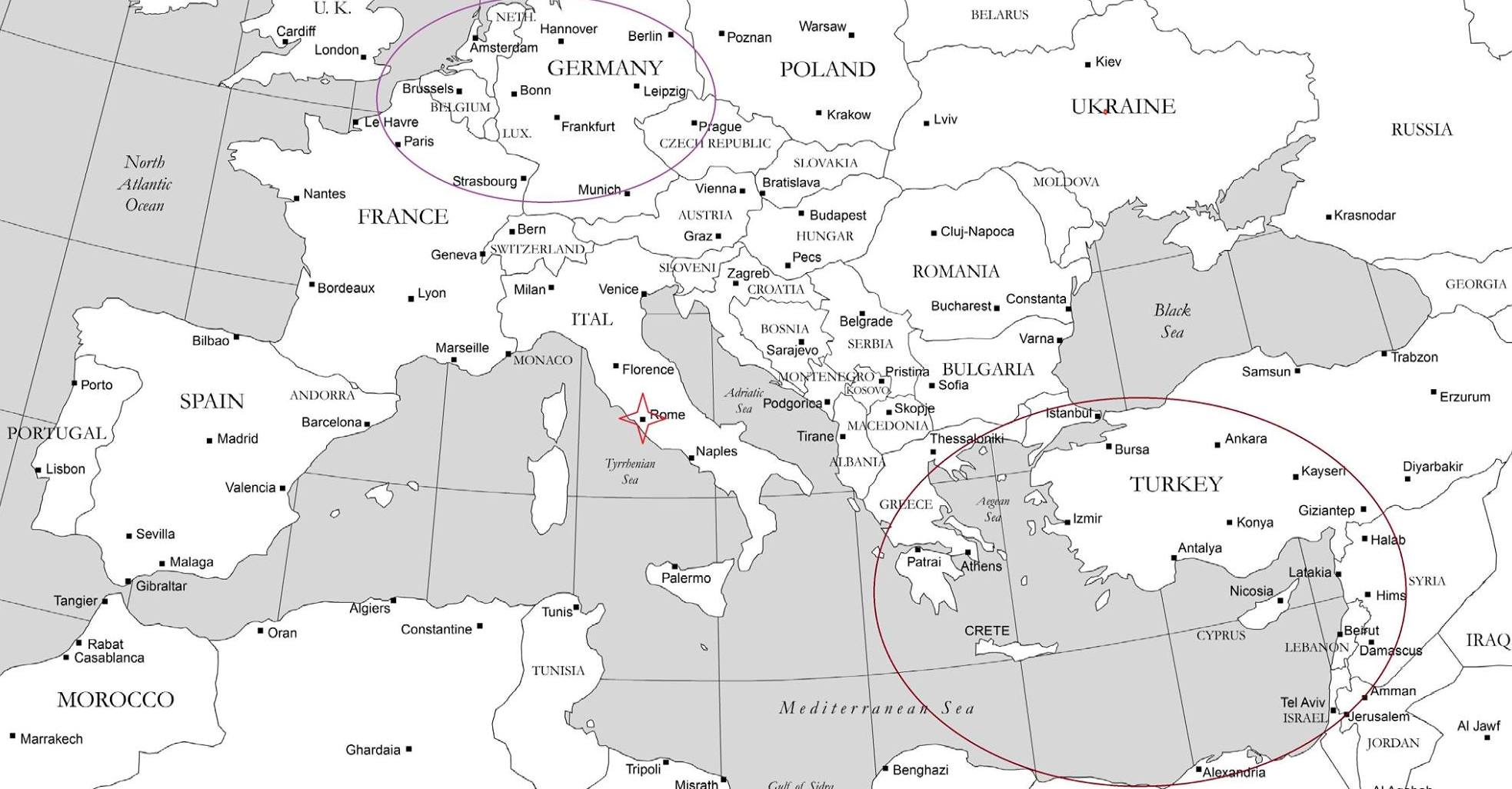
Map source: Cosmoidioglossia FB page
Thus, way earlier than the Enlightenment—i.e. the purported historical deficit of which is mourned—Greece has not gone through the Middle Ages, it hasn’t gone through the Mediaeval period («Ἡ Ἑλλάδα δὲν πέρασε Μεσαίωνα!»). For if something marks this period, it is the novel situation that emerged in Europe after the fall of Rome, the domination of new races in the geographical space that was the Roman Empire and the darkness that prevailed in the once-Roman territories, now aptly named “the Dark Ages.” This development, pivotal as it was for what today is Western and Central Europe, was hardly as influential for the European East, in which the new capital of the Roman Empire was situated since 330 AD, i.e. New Rome – Constantinople, in unperturbed succession and without the historical development of the Middle Ages. To be exact, one could say that after a prolonged late Antiquity ending in the eighth century with the Arab invasions, the Eastern Roman Empire transitioned directly to Byzantium proper without passing through Dark Ages, or a Mediaeval period and its tumultuous chaos.
Poisoning Modern Greece’s psyche
All these are examples of how forms of the West/non-West divide narrative have been used to shape Greek public opinion. And, as critical geopolitics informs us and as we have seen, we can speak of at least eight different versions and definitions of “the West.” A further problem concerns the way in which a fixation on terms like the West is problematic for Greece’s grasp of international relations, and thus politics and policy, opting for an extremely outdated understanding of the international system. We are led to a vocabulary that describes an international system that lies at least two phases behind the current one! [3] This reading, this vocabulary, reanimates a quasi-Cold War understanding of international relations, a world long gone, which accounts for slogans of a peculiar choice of words, like “we are in danger of becoming the Soviet Union” (εἴμαστε/θὰ γίνουμε/θὰ μᾶς κάνουνε Σοβιετία!, also publicly employed by the vice chairman of the official Opposition). After the Cold War, the globe experienced the “monopolar moment” of the United States, the “End of History” so forcefully refuted today by reality, and now experiences a multipolar world, a new phase that demands a new analytical tool. Rather than that, the political usage of the vague term “the West” and its corollaries in Greece reverts it to two phases behind, practically prohibiting any analysis from taking into account this new reality and tying Greece to a woefully outdated worldview.
In conclusion: the invocation of the West presents itself as having Greece’s progress as a desire, Greece’s inclusion in the more successful of contemporary nations. Does it however achieve this goal or rather its opposite? Is this fixation on the West an agent of progress or an agent of introversion, confusion, nationwide group therapy and failure? The brevity of this article does not allow me to analyse this matter in further depth. The fact remains that, I think, one thing should be clear: that this vocabulary functions only as an obstacle, not as an agent of change and progress: it operates as pernicious ideology. An exit from the by now normalised, permanent, all-encompassing crisis presupposes stopping these narratives short of poisoning Modern Greece’s psyche deeper.
*A first draft of this article was presented at International Society for Enzymology Annual Conference 2017, Opening Ceremony, Santorini island, 16 June 2017.
Sotiris Mitralexis is Assistant Professor of Philosophy at the City University of Istanbul and Visiting Research Fellow at the University of Winchester. He holds a doctorate in Philosophy from the Freie Universität Berlin and a degree in Classics from the University of Athens. During Lent term of 2017, he was Visiting Fellow at the University of Cambridge and Visiting Senior Research Associate at Peterhouse, Cambridge. He has taught Philosophy in Istanbul, Athens and Berlin, has published Ever-Moving Repose: A Contemporary Reading of Maximus the Confessor’s Theory of Time and has co-edited The Problem of Greek Identity: From the Ecumene to the Nation-State.
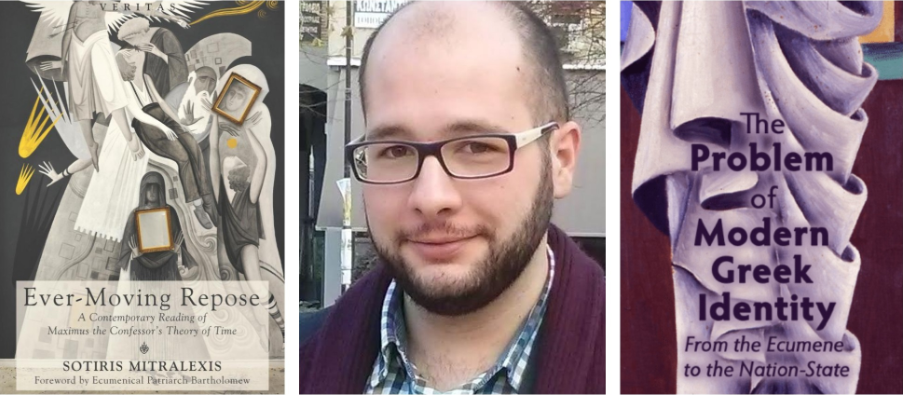 [1] Martin W. Lewis and Kären Wigen, The Myth of Continents: A Critique of Metageography (Berkeley: University of California Press, 1997), 51; the figure originates from p. 50.
[1] Martin W. Lewis and Kären Wigen, The Myth of Continents: A Critique of Metageography (Berkeley: University of California Press, 1997), 51; the figure originates from p. 50.
[2] Ibid., 49.
[3] I am grateful to Dimitris V. Peponis (cosmoidioglossia.blogspot.com) for this remark.
N.N.

